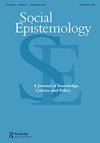认知多样性还是认知极化?论后真理世界中的认知民主
IF 2
2区 哲学
Q1 HISTORY & PHILOSOPHY OF SCIENCE
引用次数: 0
摘要
本文章由计算机程序翻译,如有差异,请以英文原文为准。
Cognitive Diversity or Cognitive Polarization? On Epistemic Democracy in a Post-Truth World
ABSTRACT Pessimism over a democracy’s ability to produce good outcomes is as longstanding as democracy itself. On one hand, democratic theorists consider democracy to be the only legitimate form of government on the basis that it alone promotes or safeguards intrinsic values like freedom, equality, and justice. On the other, skepticism toward the ordinary citizen’s cognitive capacities remains a perennial concern. Qualms about the epistemic value of democracy have only been made more pertinent by a fundamental problem of deep epistemic disagreement which underlies the post-truth phenomenon. I argue that the democratic theorists who have sought to defend democracy on epistemic grounds have thus far neglected such deep and intractable disagreements. Without addressing this oversight, the epistemic democrat will find that collective decision-making processes quickly become paralyzed and will not be able to yield the epistemic benefits they promise. Hence, the work for epistemic democrats is to recognize and take into account the ramifications of epistemic disagreements so as to make a stronger case for epistemic democracy.
求助全文
通过发布文献求助,成功后即可免费获取论文全文。
去求助
来源期刊

Social Epistemology
Multiple-
CiteScore
2.60
自引率
17.60%
发文量
60
期刊介绍:
Social Epistemology provides a forum for philosophical and social scientific enquiry that incorporates the work of scholars from a variety of disciplines who share a concern with the production, assessment and validation of knowledge. The journal covers both empirical research into the origination and transmission of knowledge and normative considerations which arise as such research is implemented, serving as a guide for directing contemporary knowledge enterprises. Social Epistemology publishes "exchanges" which are the collective product of several contributors and take the form of critical syntheses, open peer commentaries interviews, applications, provocations, reviews and responses
 求助内容:
求助内容: 应助结果提醒方式:
应助结果提醒方式:


